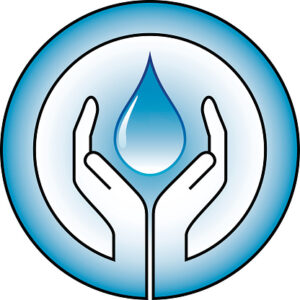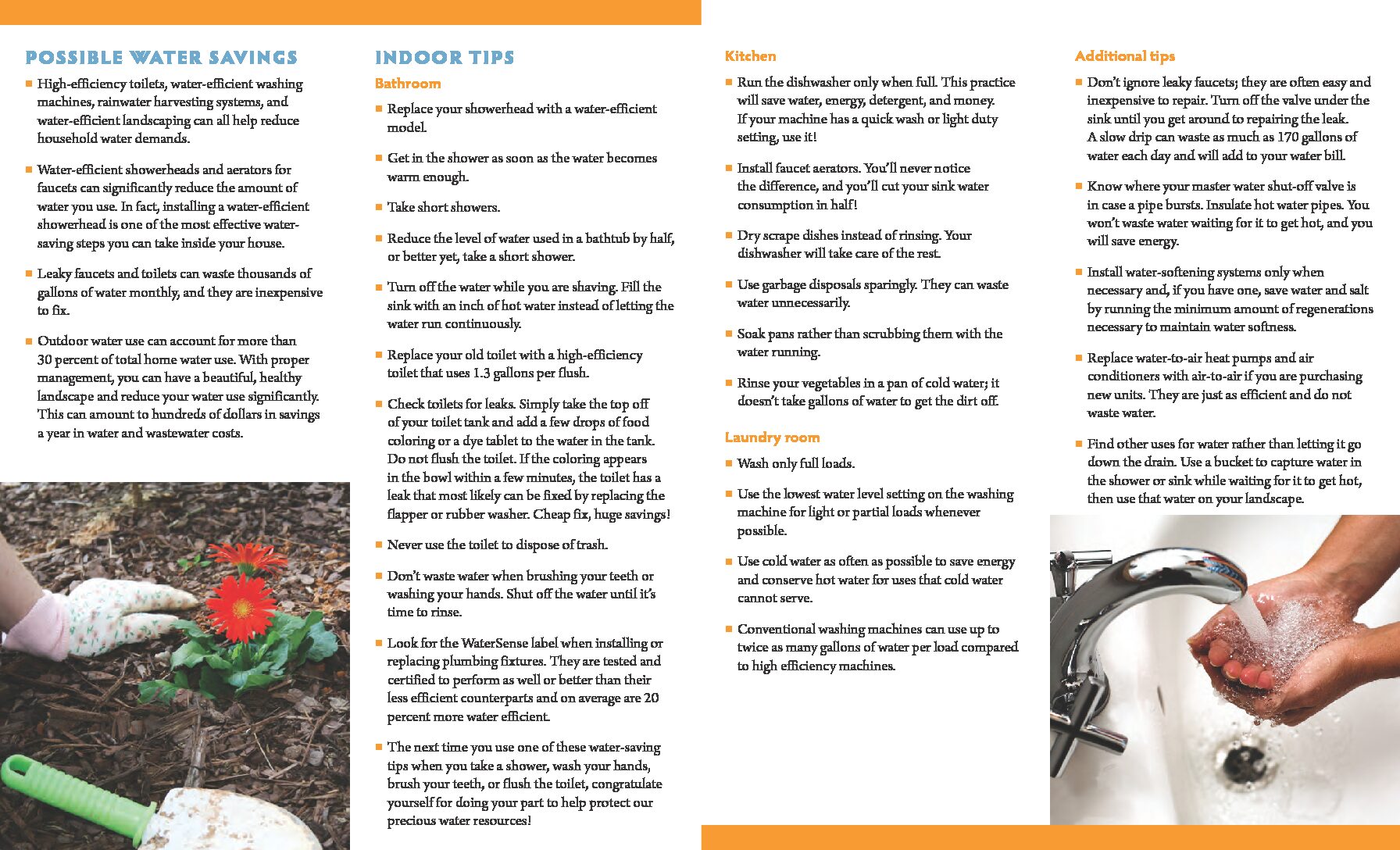Water Conservation
NOTICE: District Response to Drought Conditions in Houston Area
Due to current drought conditions in the Houston area, the District requests that all customers immediately begin implementing the following actions:
- Limit irrigation to no more than two (2) days per week, between 7:00 p.m. and 5:00 a.m. following the schedules below:
- Sundays and Thursdays for single family residential customers with even-numbered street addresses.
- Saturdays and Wednesdays for single family residential customers with odd-numbered street addresses.
- Tuesdays and Fridays for all other customers.
- No watering on Mondays. Check for and repair all leaks, dripping faucets, and running toilets.
- Utilize water conservation measures such as displacement bags, low-flow shower heads and leak detection tablets.
- Additional water conservation tips can be found at https://wateru.nhcrwa.com and www.irrygator.com.
For more information on drought conditions in the area and voluntary water conservation measures being implemented by the North Harris County Regional Water Authority, please visit: https://www.nhcrwa.com/nhcrwa-stage-1-dcp/
Hurricane Preparedness 2022
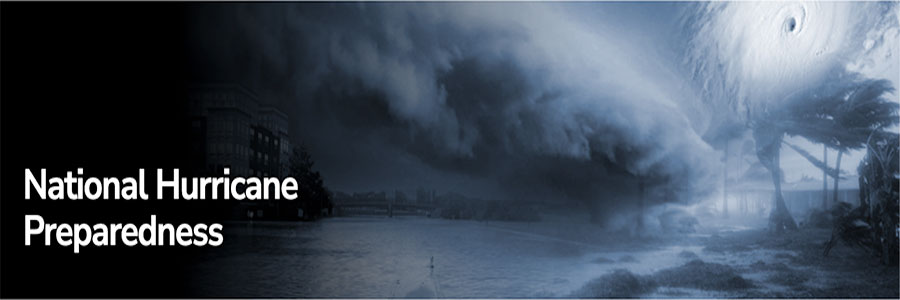
Be ready for hurricane season. Today you can determine your personal hurricane risk, find out if you live in a hurricane evacuation zone, and review/update insurance policies. You can also make a list of items to replenish hurricane emergency supplies and start thinking about how you will prepare your home for the coming hurricane season. If you live in hurricane-prone areas, you are encouraged to complete these simple preparations before hurricane season begins on June 1.
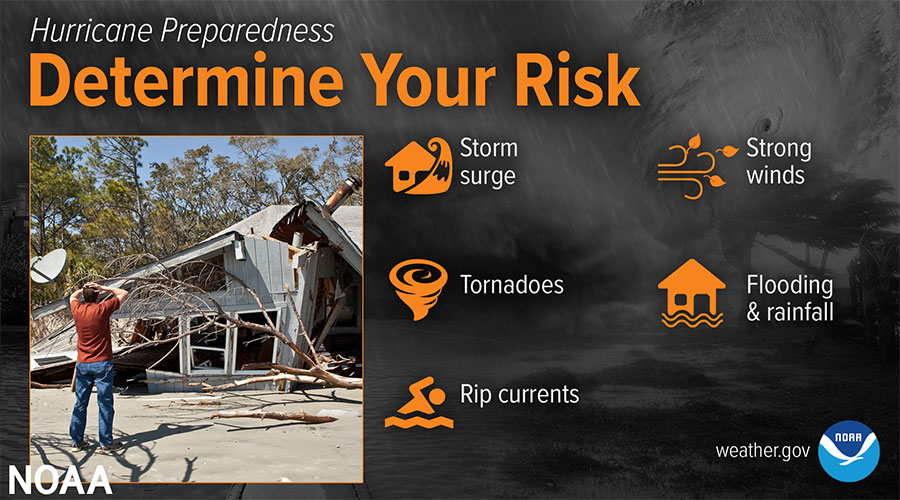
Find out today what types of wind and water hazards could happen where you live, and then start preparing how to handle them. Hurricanes are not just a coastal problem. impacts from wind and water can be felt hundreds of miles inland, and significant impacts can occur regardless of the storm’s strength. Know if you live in an area prone to flooding and if you’re safe to remain in your home.
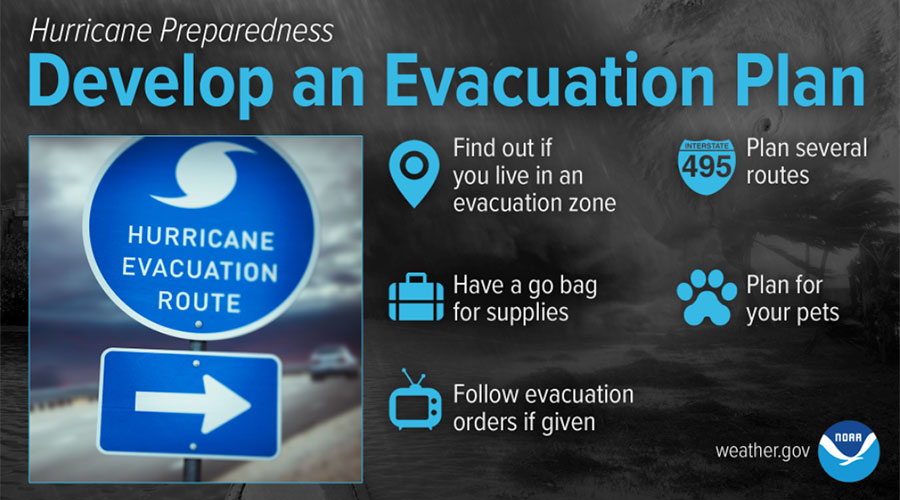
Find out if you live in a hurricane evacuation zone. You may also need to leave if you live in a flood prone area or in a mobile home outside a hurricane evacuation zone. Now is the time to begin planning where you would go and how you would get there.
You do not need to travel hundreds of miles. Your destination could be a friend or relative who lives in a well built home outside flood prone areas. Remember, your safest place may be to remain home. Be sure to account for your pets in your plan.
As hurricane season approaches, listen to local officials on questions related to how you may need to adjust any evacuation plans based on the latest health and safety guidelines from the CDC and your local officials.
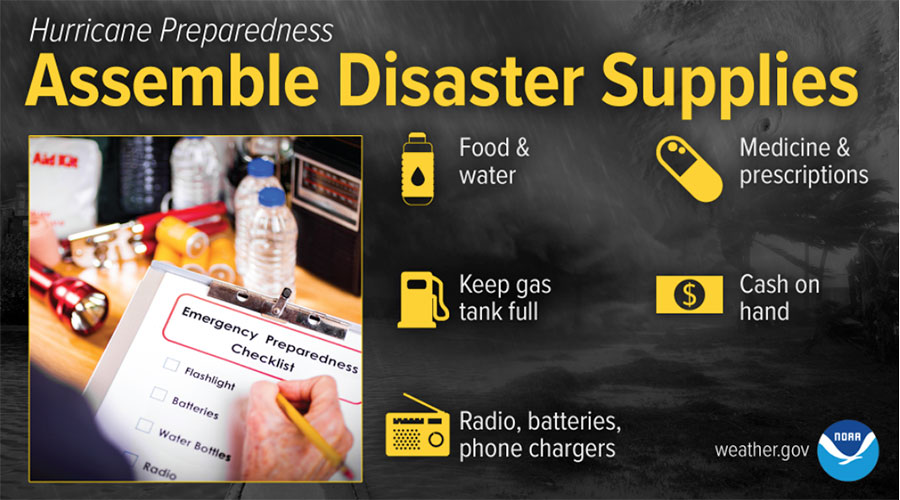
Whether you’re evacuating or sheltering-in-place, you’re going to need supplies not just to get through the storm but for the potentially lengthy and unpleasant aftermath. Have enough non-perishable food, water and medicine to last each person in your family a minimum of 3 days (store a longer than 3-day supply of water, if possible). Electricity and water could be out for at least that long. You’ll need extra cash, a battery-powered radio and flashlights. You may need a portable crank or solar-powered USB charger for your cell phones.
If you need to go to a public shelter, follow health guidelines from your local officials and the CDC.
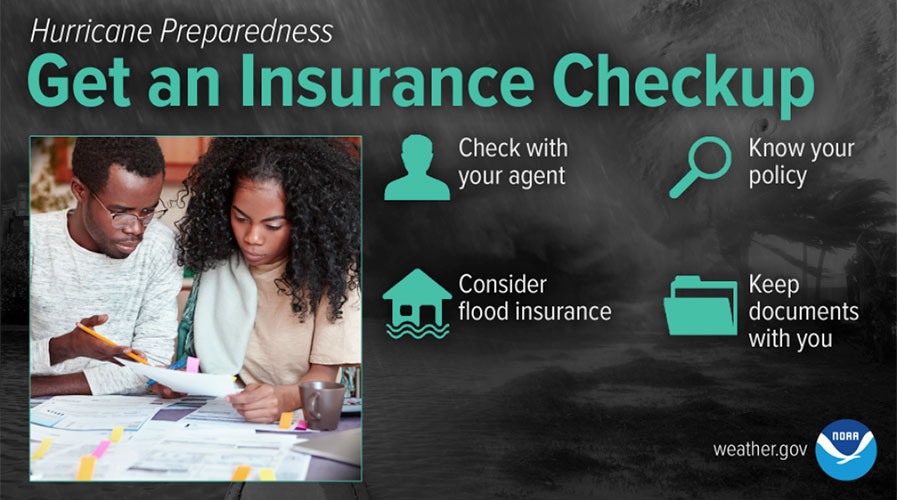
Call your insurance company or agent and ask for an insurance check-up to make sure you have enough insurance to repair or even replace your home and/or belongings. Remember, home and renters insurance doesn’t cover flooding, so you’ll need a separate policy for it.
Flood insurance is available through your company, agent, or the National Flood Insurance Program at floodsmart.gov. Act now, as flood insurance requires a 30-day waiting period.
- FLASH Insurance Guide: If Disaster Strikes, Will You Be Covered?
- Find available coverage at floodsmart.gov
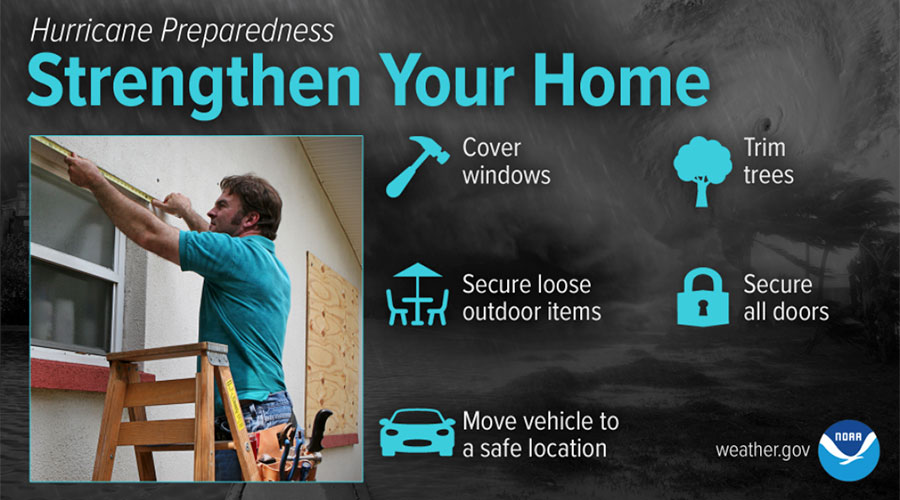
Whether you’re evacuating, or planning to ride out the storm in your home, make sure it is in good repair and up to local hurricane building code specifications to withstand wind impacts. Many retrofits are not as costly or time consuming as you may think.
Have the proper plywood, steel or aluminum panels to board up the windows and doors. Remember, the garage door is the most vulnerable part of the home, so it must be able to withstand the winds.
If you’re a renter, work with your landlord now to prepare your home for a storm.
- FLASH: How-To Videos
- Protect Your Home From Flooding Video (English/Spanish)
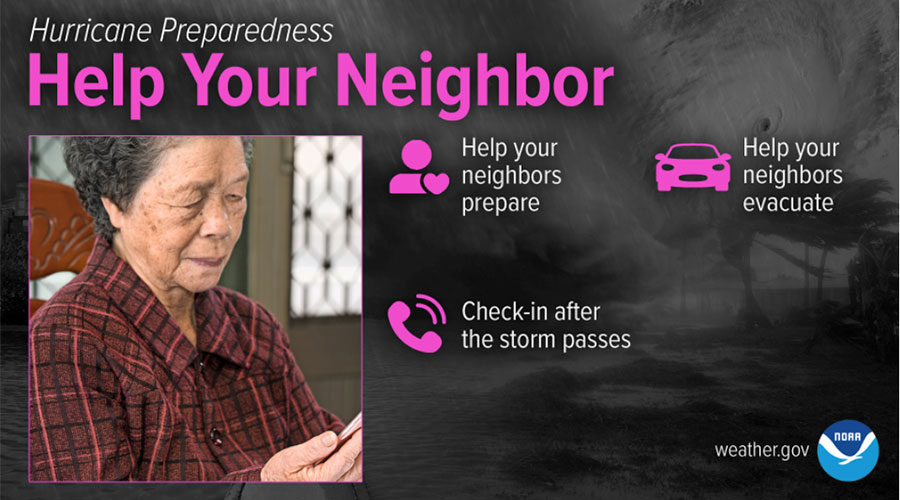
Many people rely on their neighbors before and after a disaster, and there are many ways you can help them. Learn about all the different actions you and your neighbors can take to prepare and recover from the hazards associated with hurricanes.
Start the conversation now with these Neighbor Helping Neighbor strategies but remember you may need to adjust your preparedness plans based on the latest health and safety guidelines from the CDC and your local officials.
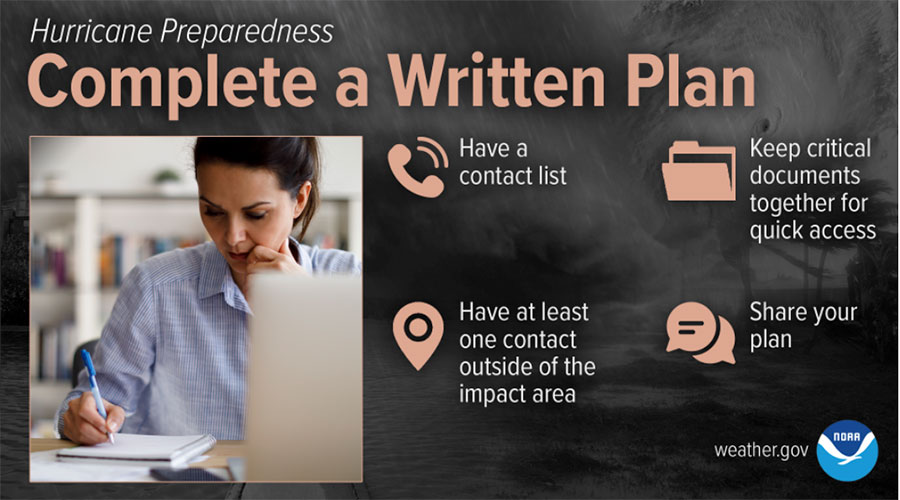
The time to prepare for a hurricane is before the season begins, when you have the time and are not under pressure. If you wait until a hurricane is on your doorstep, the odds are that you will be under duress and will make the wrong decisions.
Take the time now to write down your hurricane plan. Know who issues evacuation orders for your area, determine locations on where you will ride out the storm, and start to get your supplies now. Being prepared before a hurricane threatens makes you resilient to the hurricane impacts of wind and water. It will mean the difference between being a hurricane victim or a hurricane survivor.
Water Conservation 2022
We know living in Texas, water conservation can be inherently more difficult during the summer months and that’s why the EPA and the Texas Water Development Board has published water savings tips that will not only show you how to help conserve water, but also help you conserve cost.
The EPA has recommended the following:
Outdoors
- Maximize the use of natural vegetation and establish smaller lawns. For portions of your lot where a lawn and landscaping are desired, ask your local nursery for tips about plants and grasses with low water demand (such as creeping fescue). Consider planting more trees, shrubs, ground covers, and less grass. Shrubs and ground covers provide greenery for much of the year and usually demand less water. Use native plants in flower beds. Native plants have adapted to rainfall conditions in Texas and often provide good wildlife habitat. Cluster plants that require extra care together to minimize time and save water.
- When mowing your lawn, set the mower blades to 2-3 inches high. Longer grass shades the soil improving moisture retention, has more leaf surface to take in sunlight, allowing it to grow thicker and develop a deeper root system. This helps grass survive drought, tolerate insect damage and fend off disease.
- Only water the lawn when necessary. If you water your lawn and garden, only do it once a week, if rainfall isn’t sufficient. Avoid watering on windy and hot days. Water the lawn and garden in the morning or late in the evening to maximize the amount of water which reaches the plant roots (otherwise most of the water will evaporate). Use soaker hoses to water gardens and flower beds. If sprinklers are used, take care to be sure they don’t water walkways and buildings. When you water, put down no more than 1 inch (set out an empty cans to determine how long it takes to water 1 inch) each week. This watering pattern will encourage more healthy, deep grass roots. Over-watering is wasteful, encourages fungal growth and disease, and results in the growth of shallow, compacted root systems that are more susceptible to drought and foot traffic. If an automatic lawn irrigation system is used, be sure it has been properly installed, is programmed to deliver the appropriate amount and rate of water, and has rain shut-off capability.
- Apply mulch around shrubs and flower beds to reduce evaporation, promote plant growth and control weeds.
- Add compost or an organic matter to soil as necessary, to improve soil conditions and water retention.
- Collect rainfall for irrigation in a screened container (to prevent mosquito larvae growth).
- When washing a car, wet it quickly, then use a bucket of water to wash the car. Turn on the hose to final rinse (or let mother nature wash your car when it rains).
- Always use a broom to clean walkways, driveways, decks and porches, rather than hosing off these areas.
The EPA has recommended the following:
For Every Room in the House With Plumbing
- Repair leaky faucets, indoors and out.
- Consider replacing old equipment (like toilets, dishwahers and laundry machines).
In the Kitchen
- When cooking, peel and clean vegetables in a large bowl of water instead of under running water.
- Fill your sink or basin when washing and rinsing dishes.
- Only run the dishwasher when it’s full.
- When buying a dishwasher, select one with a “light-wash” option.
- Only use the garbage disposal when necessary (composting is a great alternative).
- Install faucet aerators.
In the Bathroom
- Take short showers instead of baths.
- Turn off the water to brush teeth, shave and soap up in the shower. Fill the sink to shave.
- Repair leaky toilets. Add 12 drops of food coloring into the tank, and if color appears in the bowl one hour later, your toilet is leaking.
- Install a toilet dam, faucet aerators and low-flow showerheads.
Laundry
- Run full loads of laundry.
- When purchasing a new washing machine, buy a water saving model that can be adjusted to the load size.
For more information, click below
The Texas Water Development Board offers water saving ideas and cost savings tips!
Leaks Can Run- But They Cannot Hide
 Drip, Drip, Drip…Let’s Talk Leaks!
Drip, Drip, Drip…Let’s Talk Leaks!
Guess what! National Fix A Leak Week is March 14-20th and we want to be sure you have the best resources to keep you informed of the little problems caused by water leaks. Awareness of what to look for and knowledge of how to fix any leak issues can go a long way in prevention and saving money. Leaks can run, but they can’t hide!
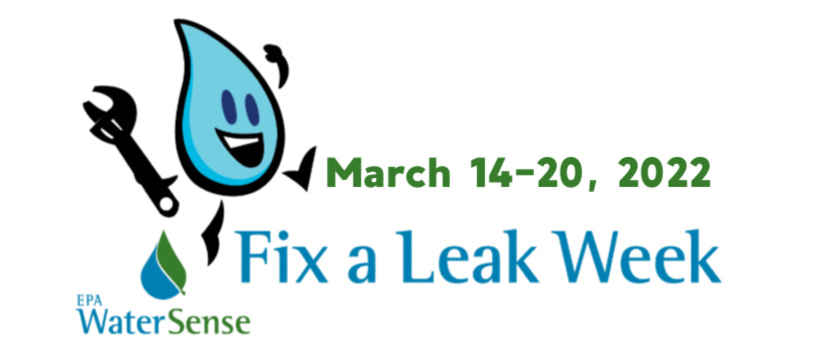
Did you know that simple faucet leaks amount to approximately 1 trillion gallons of water wasted each year? That’s huge! And so easily preventable! Not to mention, leaks are costly. Taking time each year to perform a preventative check, can help keep your check book in order.
When you are on the hunt for possible leaks, it is important to start with the data… Begin with your water bill, check your meter, and test your toilets. These will give you some clue as to the prevalence of a water leak in your home.
The EPA recommends the following checklist for tracking down a leak! Here are some of the best-known hiding places to start. Keep your ears open!
-
Bathroom
- Toilets
- Faucets
- Showerheads
- Under the sink
- Don’t forget the tub!
-
Laundry Room
- Check all of your hook-ups!
- Look for pooling in the washer itself (it could indicate a source leak)
-
Kitchen
- Check all appliances, such as the dishwasher and fridge. Many times, there are leaks behind them.
-
Basement and Garage
- Sinks
- Exposed pipes
- Water Heaters
-
Outside
- Spigots
- Irrigation controls and sprinkler heads
Well, that all depends on your plumbing skills. Whether you choose to call in a professional or venture down the DIY path, below are a few steps everyone should take… just in case.
- Turn off the water line to the leaking location.
- Identify the primary source of the leak.
- Document any and all damage (date, time, photos, description, etc.).
- If necessary, call your insurance company.
- Call in the professionals or DIY to fix any damage caused by the leak.
- Look for any secondary impacts caused by the leak, such as mold or mildew.
It’s important that everyone learn the ins and outs of their plumbing system to avoid costly repairs or surprise damages. Not only does it help protect your home and family, but you also help reduce any wasteful impacts to our water sources.
Enjoy Fix a Leak Week! Best of luck to all you DIY’ers!
Article Sources
Detect and Chase Down Leaks With Watersense
EPA- Fix a Leak Week
Home is Being Destroyed- Act Now.
How To Find Water Leaks In Your Home’s Plumbing
Dangers and Causes of Hidden Water Leaks in the House
Want to Learn More?
EPA- At Home Activity
Home Water Works
YouTube ~ Just search “Plumbing”
WaterSense- Fix a Leak Week
Other Resources
wikiHow- Find a Water Leak in Your House
Fancy Pants Homes- Common Household Water Leaks to Watch Out For/
Water Use It Wisely- Fix a Leak Week/
White House Utility District- Fix a Leak Week/
For Kids
Hurricane Preparedness 2021
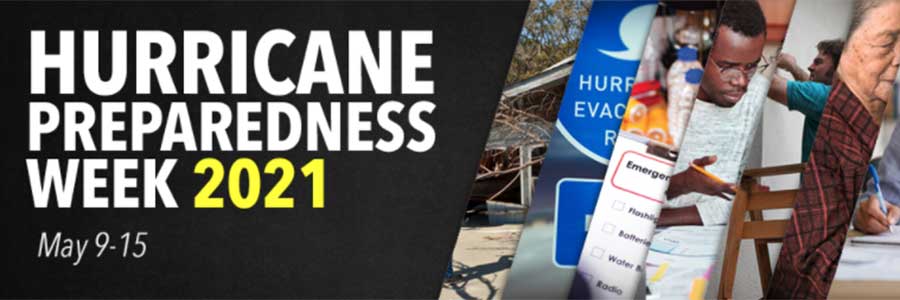
Be ready for hurricane season. Today you can determine your personal hurricane risk, find out if you live in a hurricane evacuation zone, and review/update insurance policies. You can also make a list of items to replenish hurricane emergency supplies and start thinking about how you will prepare your home for the coming hurricane season. If you live in hurricane-prone areas, you are encouraged to complete these simple preparations before hurricane season begins on June 1. Keep in mind, you may need to adjust any preparedness actions based on the latest health and safety guidelines from the CDC and your local officials.
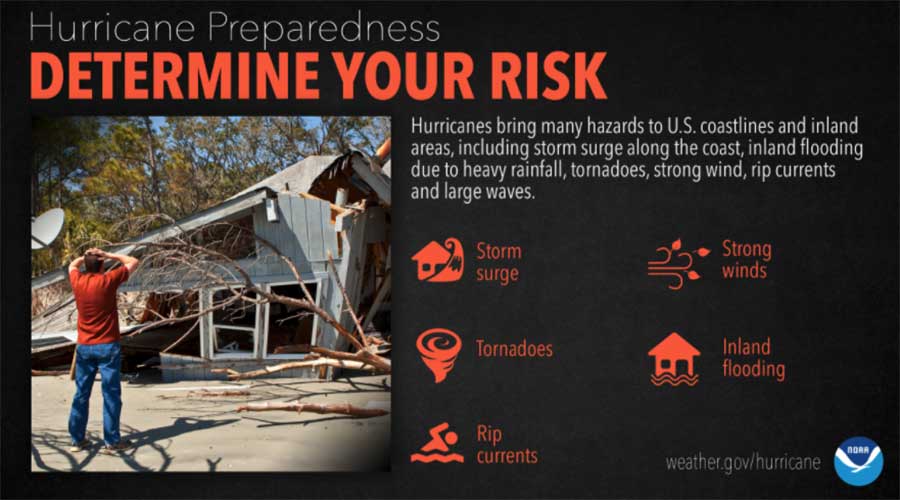
Find out today what types of wind and water hazards could happen where you live, and then start preparing how to handle them. Hurricanes are not just a coastal problem. Their impacts can be felt hundreds of miles inland, and significant impacts can occur without it being a major hurricane.
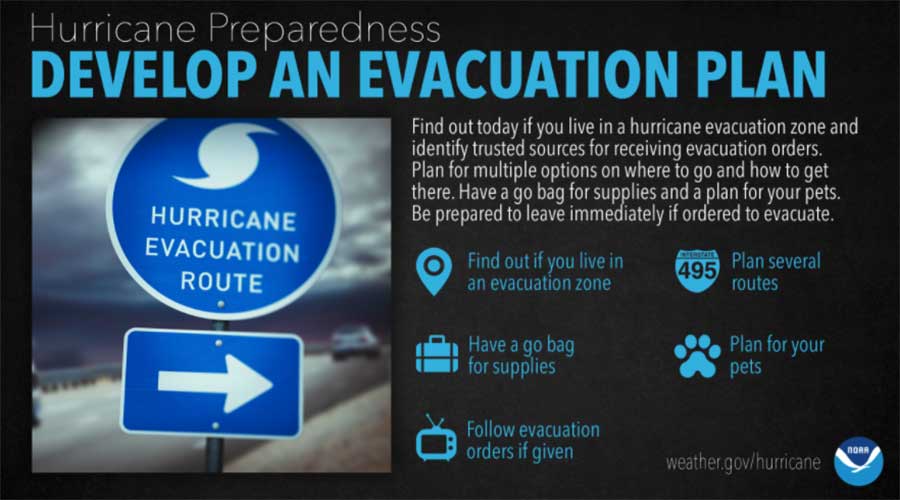
The first thing you need to do is find out if you live in a hurricane evacuation zone. If you do, now is the time to begin planning where you would go and how you would get there. You do not need to travel hundreds of miles, but have multiple options. Your destination could be a friend or relative who doesn’t live in an evacuation zone. If you live in a well-built home outside the evacuation zone, your safest place may be to remain home. Be sure to account for your pets in your plan. As hurricane season approaches, listen to local officials on questions related to how you may need to adjust any evacuation plans based on the latest health and safety guidelines from the CDC and your local officials.
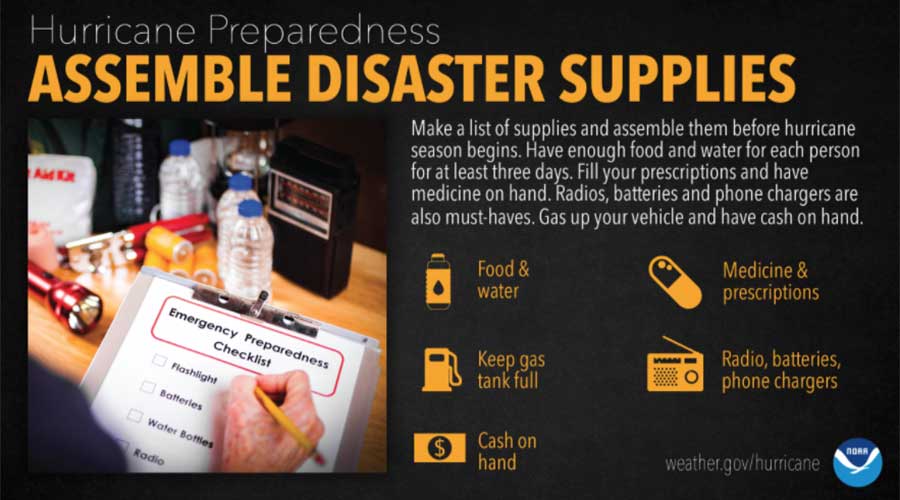
You’re going to need supplies not just to get through the storm but for the potentially lengthy and unpleasant aftermath. Have enough non-perishable food, water and medicine to last each person in your family a minimum of three days. Electricity and water could be out for at least that long. You’ll need extra cash, a battery-powered radio and flashlights. You may need a portable crank or solar-powered USB charger for your cell phones.
If you need to go to a public shelter, the CDC recommends bringing items that can help protect you and others from COVID-19, such as hand sanitizer with at least 60% alcohol, bar or liquid soap, disinfectant wipes (if available) and two masks for each person. (Children under two years old and people having trouble breathing should not wear face coverings.)
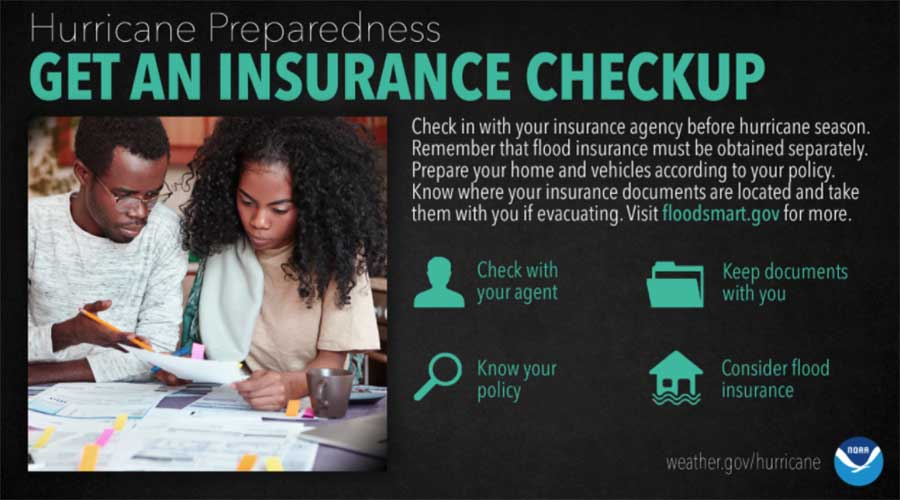
Call your insurance company or agent and ask for an insurance check-up to make sure you have enough homeowners insurance to repair or even replace your home. Don’t forget coverage for your car or boat. Remember, standard homeowners insurance doesn’t cover flooding. Whether you’re a homeowner or renter, you’ll need a separate policy for it, and it’s available through your company, agent or the National Flood Insurance Program at floodsmart.gov. Act now as flood insurance requires a 30-day waiting period.
- FLASH Insurance Guide: If Disaster Strikes, Will You Be Covered?
- Find available coverage at floodsmart.gov
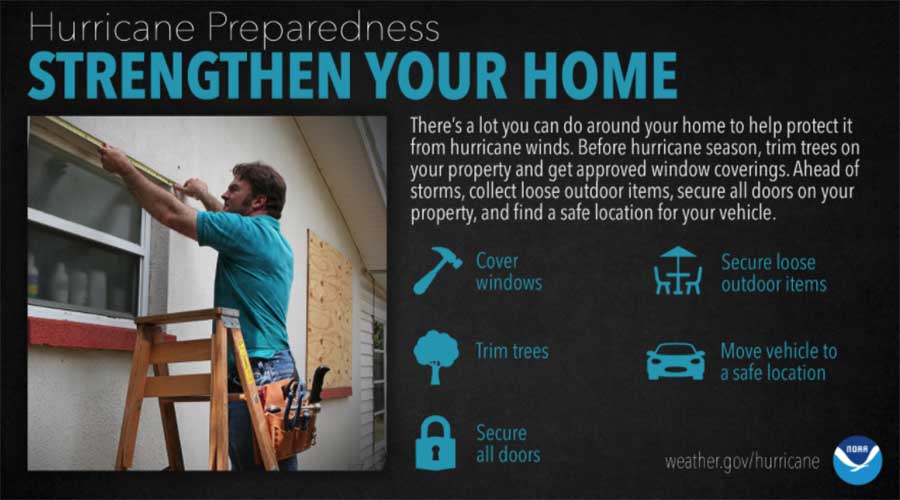
If you plan to ride out the storm in your home, make sure it is in good repair and up to local hurricane building code specifications. Many retrofits are not as costly or time consuming as you may think. Have the proper plywood, steel or aluminum panels to board up the windows and doors. Remember, the garage door is the most vulnerable part of the home, so it must be able to withstand the winds.
- FLASH: How-To Videos
- Protect Your Home From Flooding Video (English/Spanish)
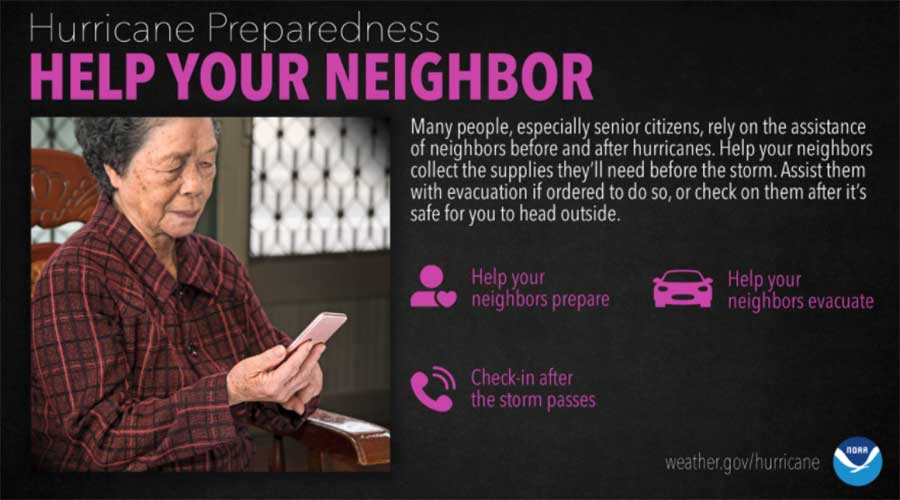
Many Americans rely on their neighbors after a disaster, but there are also many ways you can help your neighbors before a hurricane approaches. Learn about all the different actions you and your neighbors can take to prepare and recover from the hazards associated with hurricanes. Start the conversation now with these Neighbor Helping Neighbor strategies but remember you may need to adjust your preparedness plans based on the latest health and safety guidelines from the CDC and your local officials.
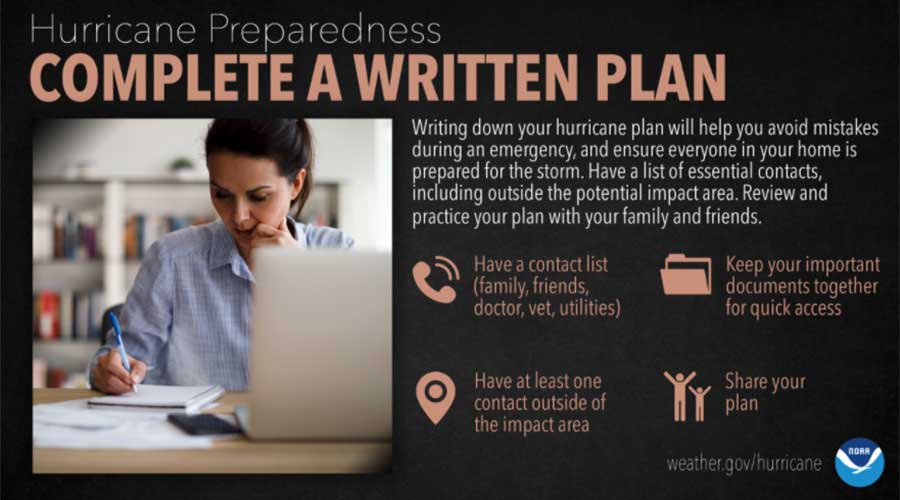
The time to prepare for a hurricane is before the season begins, when you have the time and are not under pressure. If you wait until a hurricane is on your doorstep, the odds are that you will be under duress and will make the wrong decisions. Take the time now to write down your hurricane plan. Know who issues evacuation orders for your area, determine locations on where you will ride out the storm, and start to get your supplies now. Being prepared before a hurricane threatens makes you resilient to the hurricane impacts of wind and water. It will mean the difference between being a hurricane victim or a hurricane survivor.
February 2021 Freeze Event Leak Adjustment Credits
Harris County Municipal Utility District No. 364 (the “District”) has adopted a Resolution Adopting Policy and Procedures for February 2021 Freeze Event Leak Adjustment Credits (the “Resolution”) under which the District will consider permitting a credit because of loss of water due to rupture or other damage causing a leak in a customer’s water line(s) due to the winter storm and freeze event of February 2021 (the “Freeze Event”). Credit may be given for water usage and sewer usage in excess of the customer’s average usage, as determined by the District pursuant to the Resolution (the “Freeze Event Leak Adjustment Credit”). The Freeze Event Leak Adjustment Credit is limited to the billing cycle(s) containing the days included in the Freeze Event (the “Applicable Billing Cycle(s)”) and must be requested by May 19, 2021.
Water Boil Notice Lifted- 2/19/2021 @ 5:00 p.m.
On Wednesday, February 17, 2021, Harris County MUD No. 364 issued a Boil Water Notice to inform customers, individuals, or employees that due to the extreme weather events and conditions which occurred recently in the public water system, the water from this public water system was required to be boiled prior to use for drinking water or human consumption purposes.
HCMUD No. 364 has taken the necessary corrective actions to restore the quality of the water distributed by this public water system used for drinking water or human consumption purposes and has provided TCEQ with laboratory test results that indicate that the water no longer requires boiling prior to use as of February 19, 2021.
If you have questions concerning this matter, you may contact the District’s Operator.
Water Boil Notice
Due to inclement weather conditions the following district will be under Boil Water notice until further notice: Harris County MUD 364.
To ensure destruction of all harmful bacteria and other microbes, water for drinking, cooking, and making ice should be boiled and cooled prior to use. The water should be brought to a vigorous, rolling boil and then boiled for two minutes. In lieu of boiling, you may purchase bottled water or obtain water from some other suitable source.
When it is no longer necessary to boil the water, the water system officials will notify you that the water is safe for consumption. Instructions to discontinue boiling will be issued in the same manner as this notice.
If you have questions concerning this matter, you may contact our office at (281) 367-5511.
